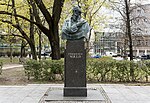Halina Mikołajska Monument
2012 establishments in Poland2012 sculpturesBronze sculptures in PolandBuildings and structures completed in 2012Commons category link is locally defined ... and 8 more
Cultural depictions of actorsMonuments and memorials in WarsawMonuments and memorials to womenOutdoor sculptures in WarsawSculptures of women in PolandStatues in PolandStatues of activistsŚródmieście Południowe

The Halina Mikołajska Monument is a monument in Warsaw, Poland, in the Downtown disctict, located in the Marshal Edward Rydz-Śmigły Park near the building of the Senate of Poland. It consists of a bronze statue of Halina Mikołajska (1925–1989), actress and activist of the pro-democratic movement in the Polish People's Republic. The monument was designed by Krystyna Fałdyga-Solska, and unveiled on 4 June 2012.
Excerpt from the Wikipedia article Halina Mikołajska Monument (License: CC BY-SA 3.0, Authors, Images).Halina Mikołajska Monument
Aleja Witolda Dąbrowskiego, Warsaw Midtown
Geographical coordinates (GPS) Address External links Nearby Places Show on map
Geographical coordinates (GPS)
| Latitude | Longitude |
|---|---|
| N 52.226422222222 ° | E 21.030344444444 ° |
Address
Pomnik Haliny Mikołajskiej
Aleja Witolda Dąbrowskiego
00-485 Warsaw, Midtown
Masovian Voivodeship, Poland
Open on Google Maps










